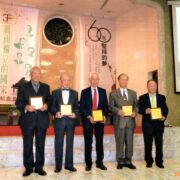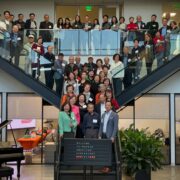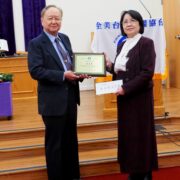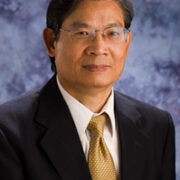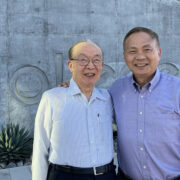The Overseas Taiwanese Student Movement And Its Impact on Post-Sunflower Movement Politics
Written by Brian Hioe

Image Credit: Cafe Philo@NYC by Enbion Micah Aan
The 2014 Sunflower Movement, over seven years ago, was a seminal moment for many Taiwanese young people. Apart from marking a generational coming of age, the movement also led to the entrance of many young people into politics and saw the emergence of many new organisations.
This also took place among overseas Taiwanese, particularly among Taiwanese students studying abroad, who were often graduate students. Many networks for mobilisation developed out of efforts to organise solidarity rallies with the Sunflower Movement and continued in the years afterwards. Prominent examples include Cafe Philo (哲學星期五) in the US, which had locations in New York, Boston, Seattle, and elsewhere, the Chicago Round Table (海外臺灣青年), and the Formosa Salon (倫敦講臺) in London. Some of these groups continue to be active today. New Bloom (破土), the bilingual independent media outlet that other participants and I in the Sunflower Movement formed in the movement’s aftermath, had its two original organisational centres in Taipei and New York. Moreover, many members in New York were involved in organising solidarity rallies there.
With extensive networks of Taiwanese students developing across the US, conferences held under the auspices of the Overseas Taiwanese for Democracy (海外臺灣青年陣線 or OTD) provided opportunities for Taiwanese students studying across the US to get to know each other. OTD was assisted in organising efforts by the Formosan Association for Public Affairs, the main Taiwanese lobbying organisation in the US.
Cafe Philo in the US was originally an offshoot of the same Cafe Philo which has held talks, discussions, and forums in Taipei for over a decade, drawing social activists, politicians and others. It proved particularly active in New York, holding events weekly near Times Square, using offices used by software engineer Hsiao Hsin-cheng (蕭新晟) for his company.
The author, who was also studying in New York from 2014 to 2016 after having participated in the Sunflower Movement in Taipei shortly before, remembered organisers of Cafe Philo stating they hoped to organise something like the weekly 4-5-6 Movement (四五六運動) anti-nuclear movement protest held in Taipei. Talks often invited Taiwanese passing through New York City to give talks about their respective fields of expertise, with topics ranging from the experience of farming pineapples to Taiwanese language cinema.
Talks organised under the mantle of Cafe Philo concerned themselves with Taiwan-related topics and provided an opportunity for self-education about Taiwan while abroad. Sometimes, but not always, this intersected with pro-Taiwan organising efforts by Taiwanese Americans born and/or raised in the US, particularly regarding efforts to raise greater awareness of Taiwan in the US—however, the language barrier of Mandarin sometimes proved a deterrent to closer collaboration.
Likewise, during this period, Taiwanese students organising in the US often collaborated with elders of the overseas Taiwanese community, including individuals who had been on the political blacklist during the authoritarian period. Post-Sunflower students studying in the US sometimes understood themselves as a new wave of the overseas Taiwanese movement,hoping to learn from the experience of their elders. Institutions founded by elders that Taiwanese students in New York collaborated with included the Taiwan Center, a local hometown place association in Flushing for Taiwanese, and The Base in Brooklyn, an establishment for Taiwanese artists—not to be confused with the anarchist community space in Brooklyn by the same name.
Part of the motivation for this wave of organisation likely had to do with the desire to stay connected with Taiwan. Organising Taiwan-related activities was one way to do so. Having conducted a series of interviews with overseas organisers as part of my 2017 oral history archive of the Sunflower Movement, the Daybreak Project, many members of overseas Taiwanese student organisations described feeling a sense of wanting to be at the Sunflower Movement. But being unable to be there in person, they still felt that they had to contribute to Taiwan somehow and tried to do so where they were.
At the same time, it is probable that part of the impetus for this wave of organising by overseas Taiwanese students was as a form of social gathering, as being in the US, they were in a foreign country. Thus, these students sought opportunities to get to know other Taiwanese who may have similar interests in the US, were studying related fields—or, missing home, simply to be connected with other Taiwanese. Sometimes it was simply about having fun during one’s youth as a student abroad. As seen with other similar groupings such as g0v—which also had a strong overseas presence, with g0v hackathons in New York City organised by the New York Cafe Philo crowd—a key aspect of social movements is their sociality. Putting the “social” in “social movement,” in other words—that is, the “fun” social aspect of social movements is what hooks people into social movements, keeps them engaged, and prevents burnout.
It is unclear as to what the effect of overseas organising on Taiwan was, necessarily. I recall an elder once relating to me that simply lighting a candle in New York had the potential to be widely reported on in Taiwan, given the traditional esteem given to Taiwanese students abroad as the best and the brightest in Taiwanese society, which was historically isolated from the international world and was always looking outwards. This may explain why the Tsai administration sought to tout that it had the support of overseas Taiwanese students in 2020 election campaigning in a series of ads with a similar name to the OTD organisation (海外台灣青年) or why a YouTube show organised by OTD members, SeaFormosa (海味鮮台派)—whose name was a pun on the Chinese name for OTD—became popular before 2020 elections.
At the same time, sometimes, there was a visible information lag between overseas organising efforts and what took place in Taiwan. In other words, Taiwanese abroad experienced ongoing events in Taiwan at a distance and often reported feeling a disconnect from discourse in Taiwan.
But to this extent, one notes that overseas Taiwanese organising led to networks being formed that continue to play a role in Taiwanese politics. Several individuals linked to New York-based overseas organising groups later ran for office in Taiwan as part of the DPP or “Third Force” parties as the NPP, often at the city councillor level. This included Hsieh Pei-fen (謝佩芬), who ran as a DPP city councillor candidate in Daan, Taipei in 2020, as well as Hsiao Hsin-cheng, who ran for city councillor in Nangang-Neihu in Taipei in 2018, and Lin Yen-fu (林彥甫), who ran and won city councillor in Hsinchu’s North District in 2018, as well as others. Sometimes such candidates recruited other Taiwanese students that they had gotten to know in New York as part of their campaign teams.
Some of these candidates entered politics due to ties that they had built with leading activists and youth politicians that they had developed during visits by these politicians to the US. A wave of speaking tours in the US by Sunflower Movement activists took place during and immediately after the movement, partly to raise funds for the movement by soliciting donations from wealthy overseas Taiwanese. Indeed, given the substantial resources of the overseas Taiwanese community, Taiwanese presidential candidates—whether DPP or KMT—usually visit the US to solicit donations from overseas Taiwanese in the US before elections. Moreover, the traditional esteem given to overseas students was used as part of the branding of such candidates when they ran, seeing as political culture in Taiwan often includes candidates emphasising that they graduated from elite universities in election advertisements.
Similar phenomena took place elsewhere, outside of New York. Lee Bo-yi (李柏毅), who ran for and became a member of the NPP’s central standing committee, was one of the organisers of the Formosa Salon in London. The Taiwan Statebuilding Party, which is sometimes thought of as a post-Sunflower Movement “Third Force” party but was formed before the Sunflower Movement, traces part of its origins to Taiwanese students studied in France. This gestures toward a larger phenomenon regarding overseas Taiwanese students returning home to run for office.
This is one way, then, in which overseas organising during the post-Sunflower years substantially influenced Taiwan. Perhaps this, too, reflects longer historical trends. During the dangwai era, one notes that activists based in Japan, or the US formed different networks that later comprised different factions in the DPP. But it is to be seen whether this also takes place with overseas Taiwanese that developed networks in the years immediately after the Sunflower Movement.
Brian Hioe was one of the founding editors of New Bloom. He is a freelance writer on social movements and politics, and occasional translator.
This article was published as part of a special issue on Taiwanese Americans.
– Source: original post
– Posted on: 06/24/2021

